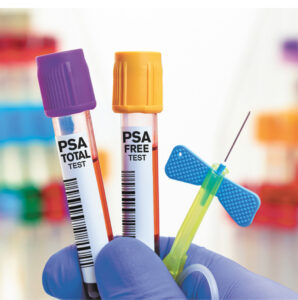New standard of care reduces number of biopsies for those with high PSAs
 The incidence of prostate cancer in Collier County has been significantly higher than the Florida state average for many years, and while the increased rate is likely due to an older population, it underscores how important screening is in our community.
The incidence of prostate cancer in Collier County has been significantly higher than the Florida state average for many years, and while the increased rate is likely due to an older population, it underscores how important screening is in our community.
Collier County’s incidence rate for 2021 was 259.3 per 100,000 male residents, while the state’s incidence rate was 169.9 per 100,000. 2021 is the last year data is publicly available from the Florida Department of Health.
Prostate cancer is a slow-growing disease that may be asymptomatic for many years. Routine screenings — the PSA (prostate-specific antigen) blood test and digital rectal exam — can detect the majority of prostate cancers in the early stages, when survival rates are more than 90% over 10 years.
However, because prostate cancer is typically slow-growing and an elevated blood test doesn’t always mean a cancer diagnosis, screenings can occasionally lead to additional, unneeded tests and even overtreatment. This has led to some healthcare organizations offering conflicting information regarding when screenings should begin, as well as their frequency.
Physicians Regional Medical Group Urologist Alexandre Rosen, M.D., recommends PSA screening begin at age 50, unless men have additional risk factors. These include being African-American or having a family history of prostate cancer. For higher-risk patients, Dr. Rosen typically starts baseline screening for men at age 40.
“The urology community strongly believes that screening for prostate cancer is important and saves lives by making an early diagnosis,” Rosen said.
Benjamin Barckley Storey, M.D., also a urologist with Physicians Regional Medical Group, agrees. “I’m a strong believer that we should collect all the information we need, and make an educated decision on possible treatment options going forward.”
Helping to make that decision for patients easier, Storey points out there is a new standard of care that leverages imaging to more accurately pinpoint areas of concern and may reduce the number of biopsies needed for patients with historically high PSAs.
For patients with suspected prostate cancer, a Focal Biopsy system allows physicians to look for potential areas of concern within the prostate using Magnetic Resonance Imaging (MRI), and if found, use a targeting system to sample those areas of concern. Focal Biopsy, which in addition to MRI uses ultrasound, allows the urologist to take a lesion seen on MRI, and guide a needle specifically to that area to biopsy.
“This system is invaluable for the patient who has had a negative prostate biopsy, but whose PSA continues to rise,” Storey said. “We can now look for a lesion, and target it much more precisely. Those patients would have been otherwise subjected to repeat biopsies.”
Dr. Rosen and Dr. Storey are now accepting new patients. For more information or to request an appointment, please call (239) 963-2499, or visit PhysiciansRegionalMedicalGroup.com.









